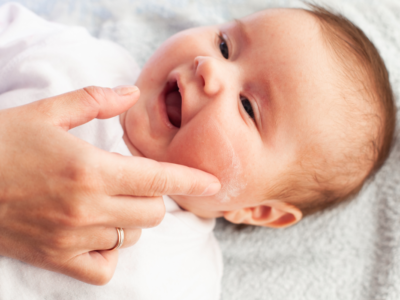If you’ve ever heard that 85-90% of a child’s brain is generally developed by five years old…that’s actually not the whole story! Although a lot of the structure of the brain is developed in the first three years of life, the development and learning window is far from closed! So what does that actually mean for you and your child? As a parent or caretaker of a developing child, you have probably already realized that there is both art and science to helping them grow. And we know it’s on your laundry list of difficult things to accomplish as a parent.
Let’s start from the top, shall we? Once you get the basics of eating and sleeping down, it’s time to take the next baby step. This is when problem solving and finding ways to give your baby the best opportunity to develop their brain comes to life. While some babies develop a little faster or a little slower than others, that doesn’t mean we all can’t hit the same “typical” milestones. Wherever you and your little are at, that’s totally okay and you shouldn’t compare to others.
We say “typical” here for a couple of reasons. First off, babies with different physical and cognitive abilities may develop a little or a lot differently. There are no “bad” ways to develop, just some that might require a more bespoke approach to scaffolding early development. If these tips don’t apply to you and your baby don’t despair, there are resources for neurodivergence and neuro atypical developing brains, as well as ways to support babies who communicate and play differently than their peers due to things like different sighted-ness or hearing or physical ability.
Here’s what we know is good for brain development:
- Nutrition supports physical and cognitive development
- Play supports learning, problem solving, flexible thinking, creativity and executive functioning
- Sleep and more sleep, supports development across all growth areas
- Affection helps little ones thrive across the lifespan
Look no further than this helpful guide from the Harvard Center for the Developing Child to know that investing time and energy into the early stages of brain development is good for individual children as well as society as a whole.
Here are some basics of early childhood brain development to keep in mind:
1. Early brain formation begins in the womb, where brain cells begin forming
2. Newborns experience a rapid period of brain growth
3. In early childhood, processes called “pruning” and “mylenation” begin. Scientists believe that these processes essentially help to streamline brain functions. We are born with an excess of neurons that get “pruned” as we develop and grow. Different parts of our brains develop at different developmental stages. For example, adolescence is a time of great development for our frontal lobes, which manages higher level executive functioning and expressive language.
According to the Harvard Center for the Developing Child, the early brain needs “supportive and responsive relationships,” (supporting healthy relationships between parents/caregivers and babies is essential at a social level and an individual level), “reduction in stress in the lives of children and families,” (at a personal and policy level) and “strengthening of core skills” through learning and play. Here is a helpful guide from the CDC to check and see if you and your baby are on track for developmental milestones that we generally watch out for.
Here are a few ways that you can support your babies brain development from 0-12 months old:
From 0-4 months:
- Verbally respond back to your baby even when they are still really small
- Start to set routines when you can
- Reduce stress for yourself when you can
- Talk, communicate, read, sing
- Cuddle and hold your baby
At about 4-6 months
- Start introducing bright colored objects
- Start to develop that “back and forth” communication style with your baby
- When your baby starts to point and look, you can point and look with them—joint attention is a great step in your child’s development
- Encourage some reaching (not always to the point of frustration but some practice reaching for objects is helpful)
At about 9-12 months
- When your baby is reaching, easy, reciprocal games may begin and can be encouraged!
- Start to comment on and ask for behaviors you want to see rather than commenting on those you don’t
- Start to expand on your babies phrases and words—you can start to scaffold their sentence building and communication
- Talk/express about what you are doing to them
- Encourage them to make noise
- Respond to pointing
Remember, you know your baby best! The more you get to know the particulars of how they are developing, you can meet them where they are. There is no clear guidebook so trust your instincts. If you remember to stay responsive, encourage play, exploration and care for yourself, your baby’s brain will develop just as it is supposed to.



